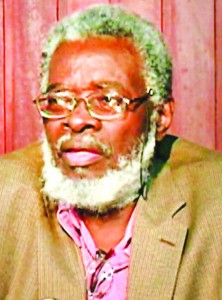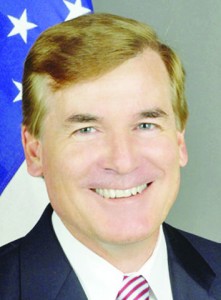
Dr Roger Luncheon
The Guyana government on Wednesday said that despite it cancelling a multibillion- dollar U. S.-sponsored governance project, some activities of the programme are still ongoing. And it has been revealed for the first time that political parties could have received commodity support valued US$ 50,000 under the programme.
“There have been repeated reports that activities in the disapproved project are being implemented, currently, by either the U. S. embassy or the USAID or the International Republican Institute,” Cabinet Secretary, Dr Roger Luncheon told a news conference at the Office of the President.
When questioned about a number of the activities being conducted in Regions Three and Four, and Cabinet members having reported that activities involved “political parties and their mobilisation”, women and children, Dr Luncheon said he had not received any reports that any activities involved the governing Peoples Progressive Party/ Civic (PPP/ C).
On the issue of the funding for political parties, he told reporters that U. S. Ambassador to Guyana, D Brent Hardt had assured him during talks up to October 2012 that political parties would not have been funded intentionally or otherwise.
“If the man tell me so, what you want? Watch the ambassador in he face and tell he he lie?” Luncheon asked.
Government had announced last month that it pulled out of the 2012 project, as a consequence of the flaws in the agreement.
Dr Luncheon said the project proposal presented to Guyana did not reflect the input of the government, as well as that of USAID, and on that basis, considerable reservations were expressed by the administration.

D Brent Hardt
He explained that the design was considered by Cabinet and both the project and the design were rejected.
“The project that habitually and conventionally is an engagement between Guyana and its development partner USAID – this one in 2012 departed from that convention. Firstly, we were presented with an agreement to sign, over which we had zero contribution.
“Secondly, when we officially got the design, there was considerable objection, as far as the administration was concerned. This design would have never ever been provided for in any bilateral relationship; as a consequence, it was rejected.”
The Cabinet secretary added that the design allowed for the involvement of USAID in the national life and politics of Guyana.
The US$ 13.1 million bilateral agreement was to advance development in health, economic growth and democracy and governance. It is believed that government had become uneasy with some of the project outlines.
Under the strengthening of the National Assembly, the project had set out to support the legislature in maximising the effectiveness of its existing website and other technology.
This may include live broadcasts of proceedings to better inform citizens, bringing the National Assembly closer to the public and encouraging greater public involvement.
According to the project, support would have included consultative processes drawing on international experts, the public, members of political parties and representatives of Parliament.
Long-term interest
On key reform issues and agendas, including needed reforms to the Guyana Elections Commission, reforms of the Constitution, local election policies, decentralisation and political party financing.
The US$ 1.5 million project was also expected to build capacity within the political parties, support holding local government elections and supporting women and youth political leadership.
Meanwhile, according to the project document, the U. S. government said the spread of stable democratic governments was in its long-term interest. It said assistance in strengthening political parties, both in government and opposition, is one way that Washington can support its friends and allies engaged in democratisation.
Moreover, the document said political party assistance provides an important means to engage a nation’s future leadership, a factor often key to advancing U. S. interests overtime.
Additionally, the goals of the USAID political party assistance are to develop and consolidate representative democracies; develop transparent political environments; establish viable democratic parties; and ensure the conduct of free and fair elections.
The USAID said the political party assistance was a new policy priority, one that requires commitment and innovation.



